14 Value Theory
Florida Jongbloed
While I’m scrolling through Funda and daydreaming about beautiful houses that I can’t afford, I wonder: what is it that I look for in a house? Would I prefer a spacious house in a village or would I rather have something smaller in a city centre? Or should I look for something closer to my friends and family? What are all these things actually worth to me and how do I decide which value outweighs the other?
What is it worth? This is one of the main questions that the philosophical field of value theory—axiology—is concerned with. Value theory is a broad field that ranges from the fundamentals of ethics to pragmatic applications such as decision making. It possesses tools that can be used to map out our values and to evaluate what is at stake when we are facing difficult decisions. This allows for conversations to be held at a different level, giving a new perspective when making difficult decisions or when trying to understand how others make them.
What is value theory all about?
Value theory is the study of value in the broadest sense of the word. For the sake of the intended application to climate change, we will focus on a specific tool that value theory encompasses, which is incommensurability: the inability to compare things. In order to understand the philosophical utility of this tool, I will give a brief introduction of some central concepts in axiology.
When evaluating values that constitute value claims, the general first step is to discern between intrinsic and instrumental values. Intrinsic values can be seen as lying underneath instrumental values, so instrumental values are the means to an end and intrinsic values are the ends themselves. For instance, imagine that you value living in a village, and wonder if this is an instrumental or intrinsic value. Perhaps a village is valuable in virtue of having a good relation to your neighbours, which is valuable for social safety, which is valuable for reduced stress, and so on. This will eventually lead to an underlying intrinsic value, such as pleasure, wisdom or authenticity, although these are up for debate.
Indeed, value theorists do not agree on whether there is just one or more intrinsic values. This is referred to as the monism/pluralism debate in value theory.

For centuries, value monists aimed to define the one true intrinsic value. Think for example about utilitarianism, the thought that the highest good is ‘pleasure’. This entails that, according to utilitarians, all other values are instrumental to pleasure. On the other hand, there are value-pluralistic philosophers such as the 20th century philosopher G. E. Moore, whose main premise is that ‘good’ is undefinable. This entails that there must be multiple intrinsic values that cannot be reduced to one another. Besides, they cannot be compared: they are incommensurable. This is an inevitable consequence of value pluralism. Moore implies that comparing values is a matter of individual judgment. He compares the concept of good to that of yellow, in the sense that neither term can be understood through definition, but can only be grasped through experience. If this is true, what can we even say about complex decision making? According to Moore, we cannot say anything, and every analysis of value is bound to fail.
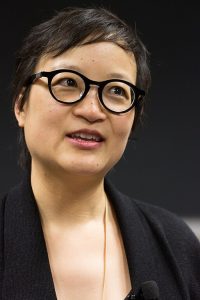
So what about practical wisdom? What about good friends or our elders who can reassure us and tell us what house to buy? This is why value-pluralism cannot be right, argues Ruth Chang, who is a lawyer and philosopher studying hard choices. Chang’s premise is that we make the mistake of comparing values to each other similarly as we do with units such as length. Namely, one is always longer or shorter than the other, or they are equally long—more, less, or equally valuable. However, this is a mistake and there is actually a fourth option: they could fail to be ‘on a par’. Non-parity occurs when there is no sufficient reason to believe that one is better than the other and yet they are not equally good. In that sense parity leads to incommensurability.
Although Chang explains where the problem of incommensurability comes from, she does not believe that value pluralism explains why it occurs. Namely, she argues that it is simply not the case that we cannot compare values or make difficult decisions: we do it all the time. That is what we use practical wisdom for, so value monism has to be right. We have the ability to make complex decisions, justify them according to our own values and formulate reasons for our opinions. Chang concludes:
Understanding hard choices in this way uncovers something about ourselves we did not know. Each of us has the power to create reasons (Ted Talk).
It is this power that gives us freedom to be the authors of our own lives, says Chang, and to decide who we want to become.[1] And, in extension to this, to decide which values will triumph over others.
Overview
Before we turn to the application to the topic of climate change, let us summarize the difference between the views discussed. The implications and differences of the views that G.E. Moore and Ruth Chang hold are summarized in the table below. The utilitarist account is added as well for comparison.
| Theory | Utilitarianism | Incomparability according to G.E. Moore | Incomparability according to Ruth Chang |
| Definition of value | One intrinsic value (happiness) | Multiple intrinsic values | Values can be compared in context |
| How are values compared? | Everything can be reduced to the intrinsic value happiness. The option that leads to the biggest amount of happiness is the best alternative. | Since there is a multitude of intrinsic values, it is not possible to compare values. Therefore, the best alternative in complex situations cannot always be known. | Practical wisdom allows us to find the best alternative in complex situations. |
| Is there a ‘best alternative’? | Yes | No | Yes |
| Approach to complexity | Simplifying choices to a single unit | Complexity is inherent and subjective | Emphasizing the power of individual reasoning |
| Prospect | You should make difficult calculations | You have to experience | You can create your own reasons |
Value Theory in practice
If we want to stand a chance against climate change, difficult decisions ought to be made. Let us take the energy transition as an example. Governments are facing decisions regarding the construction of wind farms: should they be built at the expense of birds, spatial quality, maintenance costs, land use conflicts, and community opposition, among other things? This kind of complex decisions can be viewed from a number of perspectives, which are made up of underlying values. This is where value theory comes in handy.
Imagine you are the mayor of the municipality of Groningen. You have to decide whether or not you will build a new wind farm on the grounds of your municipality. The people are divided…
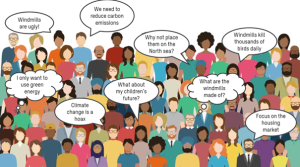
… the cacophony of voices and opinions frustrate you and you decide to hire a new employee: a Value Asset Manager. You write a job vacancy text, use the problem of the wind farm as a case, and place it on LinkedIn. Out of all applicants, three are selected for an interview: Ursula, Isaac and Pip. The aim of the interview is to learn how they will approach the problem, and how they deal with all the different angles. A transcript of the interviews is included below.
Ursula the Utilitarian
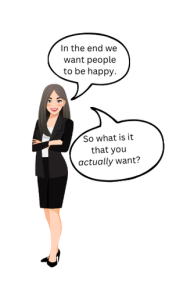 Who are you? I am Ursula, and I think there is only one thing that truly matters: to maximise the total amount of happiness. I think that all values are instrumental to this purpose. Therefore I think that the best alternative is whichever one brings out the most happiness in the largest possible number of people.
Who are you? I am Ursula, and I think there is only one thing that truly matters: to maximise the total amount of happiness. I think that all values are instrumental to this purpose. Therefore I think that the best alternative is whichever one brings out the most happiness in the largest possible number of people.
How do you tackle the wind farm problem? I always employ the Greatest Happiness Principle of my role model Jeremy Bentham. This entails that actions are right insofar as they promote the happiness for the greatest number of people. So to find out what the best alternative is, we should see every opinion in terms of happiness. I will interview all the stakeholders and determine how happy each option will make them. The goal is to find out what is behind each opinion, so that we find out how their views relate to happiness. I will use the outcome as input for a simple cost-benefit analysis. See for example this website of the Dutch government.
Where do you work currently? I make governmental decisions transparent by making cost-benefit analyses for them. I use the amount of happiness that something brings out as input. Alternatively, I translate the amount of happiness into an amount of money. You’d be surprised to see how similar those two are in practice. My clients don’t refute my methods, so I suppose they are effective. Ultimately, in my experience, we can cover most things with money or otherwise compensate them.
What do you bring to the team? I think that understanding values in terms of pleasure is fairly easy to understand. And by translating the values into money, it becomes easy to apply. My method is thereby extremely effective. It makes it possible to perform quantitative analyses by taking away the subjective, which is what governments want. That is because their decisions must be traceable since they work with public money.
What is your pitfall? Although sometimes the underlying values are obvious, other times it can be challenging to see how opinions translate into happiness. Is not clear how each of these values reduce to happiness, and certainly not to which extent. It could be that the wind farm problem is too complex to fully assess the effect of each option on the total amount of happiness. Therefore, when decisions are made, there could be values that are neglected. For instance, the ethics of future generations are not included in this measurement method. [2]
Isaac the Incommensurable Idealist
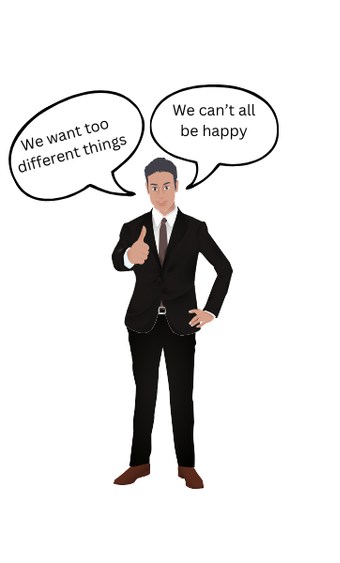
Who are you? I am Isaac, and I don’t think that happiness is the only value that there is, so you may call me a value pluralist. I think that there is a multitude of values, and it doesn’t make sense to try to arrange them or to prioritise amongst them. How can I judge the impact of a windmill if I have not lived next to one? Or how can I understand the impact on birds if I am not an ecologist nor a bird myself?
How do you tackle the wind farm problem? I think the best alternative can simply not be found. So my question to you is, mayor, do you really think it is possible to make the best decision?
I am not saying you should do nothing though, but it is important to see the problem from all possible angles.
That is why I have a broad network of experts that I will consult for this job. I will collect input from specialists in sound and birds, from environmental lawyers and all the residents, and talk to project managers of similar projects. This may result in an enormous amount of views, opinions and opposing values. I am not quite sure what the next step would be, but at least we will not overlook any stakeholders.
Where do you work currently? I am a data analyst, stakeholder manager, and I coordinate various research activities. My objective is to know all possible angles that exist when we consider wind farms. I am regularly hired by the Ministry of Infrastructure to collect this data for them, and I make sure that they have as much information as possible. The European Union obliges my clients to collect all these insights by the way.[3] We document it in thick reports that we safely store in drawers. What my clients do with the reports you ask? I am actually not sure. Fortunately, I don’t have to make the decisions myself!
What do you bring to the team? I ensure that all values are treated equally, and that decisions do not surpass the people. I value transparency and honesty to the utmost by not favouring certain values over others.
What is your pitfall? To be honest, I find it hard to make decisions. You can never really know all the angles and if there are different values underneath, you certainly cannot weigh them against each other. This translates into the government wanting to secure all the collected angles, just to be transparent to the taxpayer. I experience that I sometimes freeze because of that. The governments also freeze when faced with these tremendously complex decisions, leading to ultra-conservative bureaucracy.
Pip the parity-partisan
 Who are you? I am Pip, I have recently decided to switch careers. I am totally new to the world of wind farms and decision-making, but I know that this is the direction I currently want to go with my life.
Who are you? I am Pip, I have recently decided to switch careers. I am totally new to the world of wind farms and decision-making, but I know that this is the direction I currently want to go with my life.
How do you tackle the wind farm problem? You can go either way, no one knows the true best option. In fact, I actually believe there is none.
However, if you want a sustainable future, just go for it! You have the power to enhance the energy transition and to enable future generations to benefit from the green energy. I know that people will resist, but they don’t see the totality of the problem. Their misery will also go away. I can think of a hundred reasons why you should build the wind farm. Or did you want an argument not to do it? I have a hundred of those too, just tell me what you want and I will help you do or become just that.
Where do you work currently? I own two startups and once a week I am hired as a strategic innovation consultant. I have been a job-hopper for a while now. I occasionally decide to change course. Recruiters have always found me because of my affinity with innovation and strategic investment. In other words, I like being at the helm and deciding where things should go.
What do you bring to the team? I bring decisiveness, innovation and boldness. With me in your team, tough decisions will not be procrastinated but settled with determination. I will make sure that you reach your goals. I will make you see that the option to build more windmills is not on par with the option to build none. This view helps you to move forward from this difficult decision, because it means that no one will know what we ought to do. That is why we will create our own reasons in virtue of your decision. We will start with your ambition.
What is your pitfall?
I can sometimes be too quick, and then I overlook the views of others. You may wonder what gives governments the right to make choices that impact the people. After all, they do their work with public money. I can imagine that my ideas might cause problems for the residents.
That is why you mainly see my method in companies and startups. They can afford to dare, to innovate. Governments are limited in that sense: they have to account for themselves at all times.
>> Who do you hire?
Conclusion
Climate change requires climate action, which requires making complex decisions together with other stakeholders. This often means making tough decisions with a lot of voices and a lot of values in the mix. That is where value theory comes in—think of it as our philosophical tool for figuring out what really matters when we are faced with these complex choices. We met three different approaches to decision-making through our interviews: Ursula, Isaac, and Pip. Each of them brought something unique to the table. Ursula, the Utilitarian, promoted maximizing the amount of happiness, making it straightforward to evaluate options, but maybe missing the point that some values cannot easily be translated into happiness. Isaac, the Incommensurable Idealist, reminded us that our multitude of intrinsic values cannot be compared to each other. He highlighted the importance of diverse perspectives but did not make it easier to make a decision. And then there is Pip, the Parity-Partisan, who prefers to take bold action and who believes we can create our own reasons for the decisions we make. This is empowering, although it could overshadow lesser heard views and values.
In the end, the mayor of Groningen decided that no single approach will solve the dilemma of the wind farm. Each perspective has its advantages and pitfalls, and we need to keep them all in mind when navigating complex decisions. That is why a focus group was organised, which all three were a part of. The key takeaway is that all stakeholders have their own values that underpin their opinions. If the city of Groningen wants a successful project where they can build a few more windmills, they will need successful cooperation. And by understanding what the stakeholders value and, in extension, how they make decisions, the mayor can tackle the challenges ahead.
Philosophical exercises
Job application
What would you do if you were to apply to the mayor’s job vacancy?
- What are your core values?
- How do they affect your approach to the wind farm problem?
Asking for advice
Think about a complex decision that lies ahead of you. Think for example about work, family, friends, your partner, whether or not to get a new pet. Write down 5 different people, they can be anyone. These can be people that are close to you, but fictional characters are also possible. What advice would each of them give you?
- What values are underpinning their advice? Distinguish between intrinsic and instrumental values.
- Do you share these values with them?
- To whom do you listen?
De Rijdende Rechter
Watch an episode of De Rijdende Rechter or, alternatively, Judge Rinder.
- Describe all perspectives and sort all the ‘arguments’.
- How would you weigh these arguments/angry cries?
- What are the underlying values? Do you sympathize with them?
- How would you weigh these values?
References
G.E. Moore – Principa Ethica (1903)
Ruth Chang: How to make hard decisions, Ted Talk
Ruth Chang, 2002. “The possibility of parity”, Ethics, 112: 659-688
Non-philosophical skill: facilitating
I facilitated a group discussion at my work to put value theory (or decision theory) into practice. I asked my colleagues to reflect on ethical dilemmas that they stumble upon during their work activities. I ‘translated’ them into oversimplified statements so that they polarize. This was the aim: to be controversial and to start a discussion. I did not take part in the discussion myself, my role was to facilitate and keep the discussion fruitful.
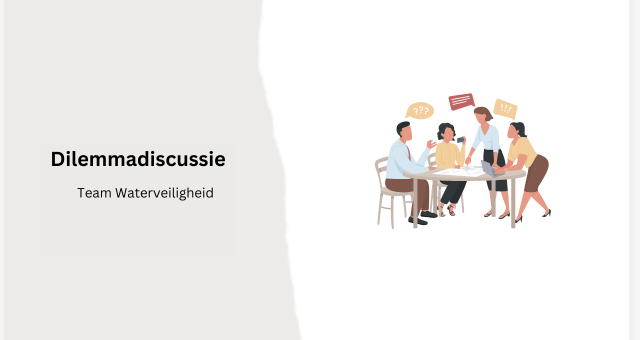
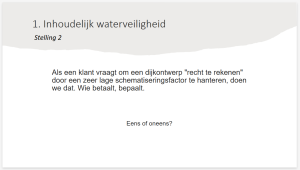
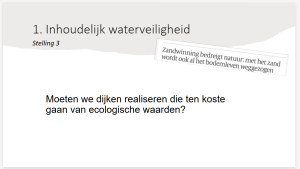
- To read more about this freedom, see the chapter 'Bad Faith'. ↵
- Read more about the ethics of future generations in the chapter 'Longtermism'. ↵
- This is laid down in the Amending Directive 2011/92/EU: On the assessment of the effects of certain public and private projects on the environment. The official European law can be found here, a more accessible explanation of the so-called Milieu Effecten Rapportage (or MER) can be found on this webpage). ↵
